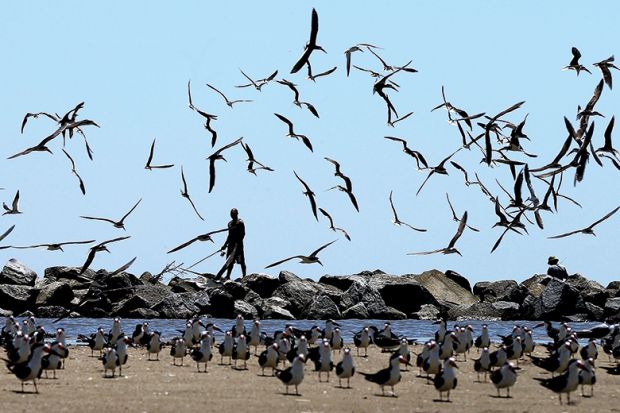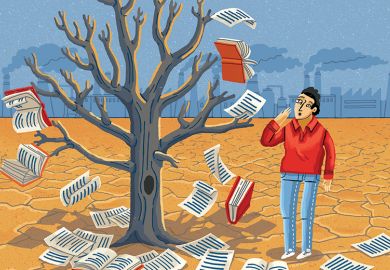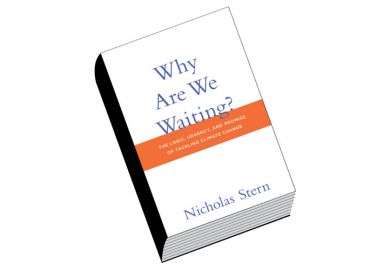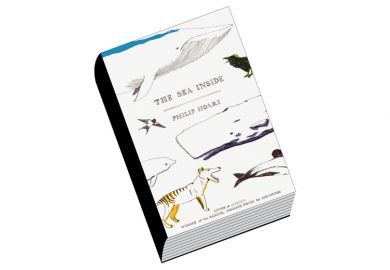One day in April, Jack Davis was in his office at the University of Florida in Gainesville, “reading the riot act to a graduate student about his sloppy writing”. But his exhortations – the student was “a good student but he just wasn’t following instruction” – were interrupted as Davis’ office and mobile phones began ringing and beeping incessantly.
“Worried that there might be some emergency”, he picked up his cell phone and opened a text message from his editor. And that is how he learned that he had won the Pulitzer Prize for History.
“I muttered: ‘Holy shit!’” Davis tells Times Higher Education. “Then I fell silent. I was stunned. I had to slide the phone across the desk to show the graduate student because I didn’t know how to say it. I think he was pleased because he knew that that was the end of the meeting.”
Davis is a professor of environmental history, a field he defines as being “interested not simply in human impact on the natural world but also in how nature is a historical agent, how it shapes the course of human history”. Accordingly, he and his students “explore that dialectic” in classes such as the history of sustainability and the history of water.
His prizewinning book, The Gulf: The Making of an American Sea, published in 2017, takes that approach to the Gulf of Mexico’s history. Its main narrative begins with the shifting and convulsing of tectonic plates that created the Gulf 150 million years ago, with subsequent chapters structured around different elements of the natural world – fish, birds, water, oil, beaches – that have drawn and enriched the Gulf’s human inhabitants.
The stories of some of those inhabitants are interwoven with this natural history. These include the three generations of the Griffith family who sat on the roof of their Louisiana house as the whole building was swept away by a storm surge during Hurricane Audrey in 1957; the conquistador Juan Ponce de León, killed by a native Calusa warrior’s dart laced with poison from the fruit of the manchineel tree, named “manzanilla de la muerte” (“little apple of death”) by the Spanish; and the painter Walter Anderson, who would sail or swim out to an island off the coast of Mississippi to live wild for weeks on end, while sketching birds, being bitten by snakes and, on one occasion, ignoring a coastguard boat that came to rescue him during a hurricane. The beautiful, lyrical descriptions of Anderson’s life on Horn Island are a prime example of how the book achieves an accessible blend of “traditional historical narrative combined with nature writing”, as Davis puts it.
Then there is the destruction wrought by the oil industry. That began on 10 January 1901 at Spindletop, near Beaumont, Texas, when a drilling rig began to shake and a gusher the likes of which had never been seen before spewed forth, “a roaring stream of crude that seemed enraged by the disturbance from its million-year slumber”, shooting 150 feet into the sky, “before doubling into a shower over dancing roughnecks”. And it culminated in the 2010 Deepwater Horizon disaster, when an oil drilling rig off the coast of Louisiana exploded, creating a catastrophic oil spill.
One feature of the Columbia University-administered Pulitzer Prizes – which describe themselves as “the country’s most prestigious awards…in journalism, letters, and music” – is that no shortlist is published ahead of the results announcement. So while journalists awaited the results “like the countdown to [a] space shuttle launch or something”, Davis had no idea that his editor had even entered him, never mind that the results were being announced that day.
“People ask me: ‘How does it feel [to have won]?’ And I say: ‘Well, it feels like somebody else’s life.’ Because I just never imagined my name or something I had written being associated with the Pulitzer.” He adds that the acclaim for it is “about the sea, and I’m really happy about that”.
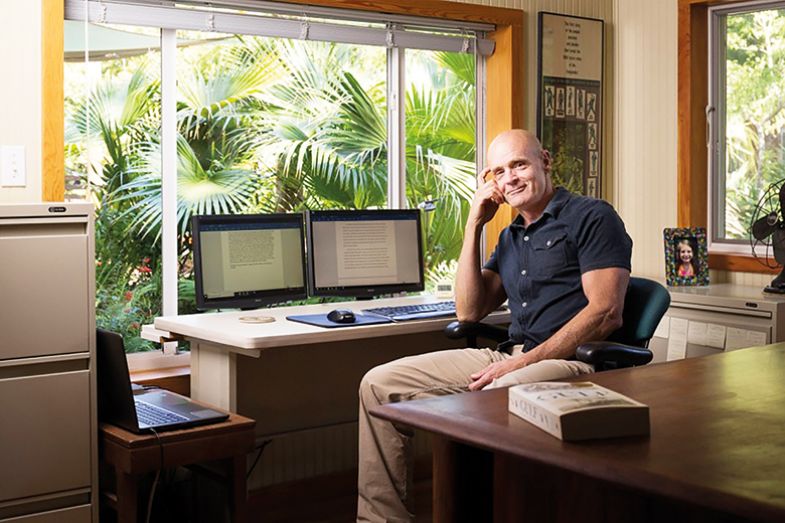
Jack Davis of the University of Florida in Gainesville and Pulitzer prizewinner
Davis’ innovative, accessible way of writing about environmentalism has risen to prominence at a time when environmental protections and climate change science are under attack from powerful sections of the US’ right-wing media and political class. And Davis hopes that his book can, in some way, help “stimulate a backlash”.
He is also pleased to have been able to present a truly three-dimensional perspective on the Gulf region, given history books’ traditional focus on the north-east’s role in early US history – partly stemming, he says, from the fact that first European settlement of the Gulf was “by the Spanish, and the Spanish aren’t considered real Americans”.
“[In writing the book] I wanted my readers to know that the Gulf is more than this vacation spot, more than an oil field; that it has this rich and wonderful history that’s really not been integrated into the larger historical narrative [of the US] by historians,” Davis says.
Writing The Gulf – which also earned Davis the Kirkus Prize for non-fiction and made him a finalist in the National Book Critics Circle non-fiction award – was particularly meaningful to him given that he spent much of his childhood on Florida’s Gulf coast. During that period, the sea was “a real outlet” for him. “I grew up with two sisters, so I was sometimes on my own,” Davis says. “Sometimes we lived in places where I didn’t have a lot of kids in the neighbourhood. I had to find ways to keep myself entertained and occupied.” So he “sailed, waterskied, scuba-dived, fished, windsurfed” on the Gulf. As he puts it in the book’s acknowledgements, for him “the docks were [my] sidewalks…a little motorboat my bicycle, and a rod and reel my bat and ball”.
That background also helps to explain why Davis adopted environmental history as his academic field. “In Florida, you’re exposed to the natural environment, but you’re also exposed to the destruction of that natural environment. You witness it every day,” he explains. However, he did not start postgraduate study until he was 31. After his undergraduate degree at the University of South Florida, he spent the next decade “trying to find my way in life”. His first job was as a salesman for a manufacturer. This was “in the 1980s, during the yuppie years, and I thought I wanted to be a yuppie”. But it was a job he “hated the day I started”, and, after turning 30, he vowed to “find something that gives me fulfilment”.
The question was what. “My childhood was not steeped in intellectual pursuits,” Davis explains. His father was a “sporadically employed salesman-entrepreneur: a failed entrepreneur”; his mother was a housewife. But his maternal grandfather, who died before Davis was born, had been a history professor, and Davis learned more about him after reading some of his papers. “I found a [role] model, which I did not have among any other family member. That was important inspiration,” he says.
After his PhD, he worked at the University of Alabama at Birmingham, the University of Jordan and Florida’s Eckerd College. The Gulf is the 62-year-old’s third solo-authored book.
But before that stunning moment in his office in April, Davis would never have been “naive” enough to believe that he could win a Pulitzer. When he was in high school, “I didn’t think about being a writer; I thought about skipping school.” He skipped “a lot” in his senior year and “went on edifying adventures. I went to museums, I went to natural places. Which ultimately, I think, were probably more important to me than to sit in [class] in my last semester in my senior year being bored out of my mind.”
The Gulf explains how the region is uniquely exposed to the impact of the fossil fuel industry on climate change and sea levels. The coast is low-lying, without cliffs, and the warm waters fuel hurricanes that, in turn, drive huge storm surges. This endangers an ever-increasing number of people. Florida’s superb beaches, alongside the advent of air conditioning and mosquito control, drove a post-war property boom that has seen the Sunshine State’s population mushroom, making it the US’ third most populous state, after California and fellow Gulf state Texas.
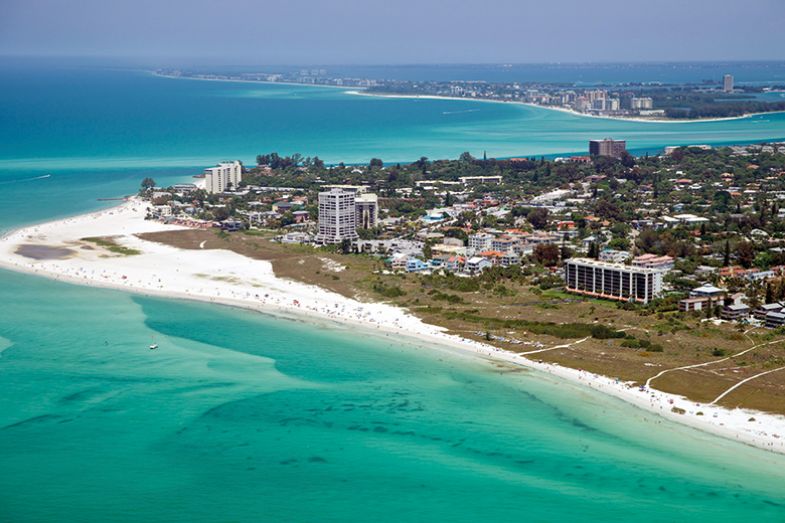
The Florida Keys is illustrative of the extent of coastal development in the state
But the science of climate change is by no means accepted by everyone. All five of the states that have a Gulf coastline – the other three being Louisiana, Mississippi and Alabama – voted for Donald Trump in the 2016 presidential election. Trump quickly fulfilled an election pledge to pull the US out of the Paris climate accord, and he has previously described climate change as a Chinese plot to make the US less competitive and as a “money-making” hoax. Meanwhile, Andrew Wheeler, a former lobbyist for the coal industry, leads the Environmental Protection Agency, having recently succeeded Trump’s first pick, Scott Pruitt, the scandal-bound climate change sceptic who, in a previous job as Oklahoma attorney general, spent most of his time fighting EPA regulations.
So is it hard for Davis to get his pro-environmentalism message through in such an era?
“It is and it isn’t,” he answers. “Because there are so many people [who] realise how lame Scott Pruitt is – not to mention the president. So they are eager for people like me to get the word out and to be an advocate for, at the very least a conversation, a serious conversation, on climate change.” Davis has given more than 30 public talks around the US since The Gulf was published last year; at the end of them, he says, audience members “come up to me, and they are so grateful [and say:] ‘This is what we need.’”
Ronald Reagan’s administration “was a disaster for the environment, too”, given the 1980s president’s “very pro-business, anti-environment agenda”, Davis says. But, during the same era, membership of local and national environmental organisations “exploded”. So “in some minor way, perhaps, this book is a vehicle helping to drive the same sort of backlash”.
Moreover, The Gulf ’s accessible style – consciously aimed not at academics but at “intellectually curious people” – and its self-presentation as a history, rather than “a book about the Gulf environment”, have allowed Davis to preach to “more than just the choir”, presenting as its “heroes” the “activists and government officials” who have battled big industry to clean up the Gulf.
“And the Pulitzer obviously helps,” Davis adds.
His bold ambition for his next book is to appeal directly to America’s political right, with a pro-conservation message shaped around a natural and cultural history of the bald eagle. “My strategy with the Gulf book was to present this as an American sea: to reach an American audience, not just a regional audience. With [the bald eagle book] I’m trying to take things a step further and reach the red, white and blue Americans,” he says.
In writing the book, Davis’ thoughts, therefore, are “constantly” with viewers of Fox News: the ultra-conservative broadcaster famously favoured by Trump, from whom Davis hopes to get an invitation to discuss his new book when it is published. His approach is always to ask himself: “How do I phrase this in a way that [Fox News viewers] can digest, that they will accept, that won’t be a turn-off for them? I really do believe that we need to have these conversations across these [political] divides.”
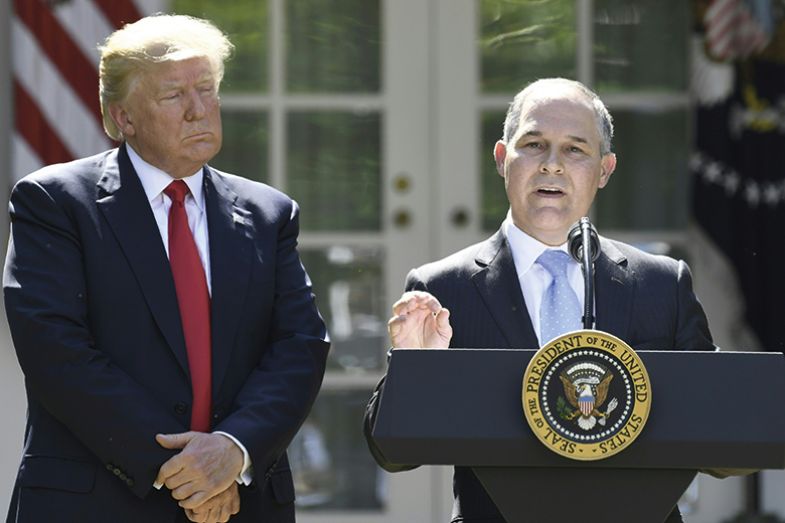
US President Donald Trump stands alongside former Environmental Protection Agency administrator Scott Pruitt, who announces the withdrawal of the US from the Paris Climate Accord
His point is that “whether you’re a tree-hugger or a flag-waver, you appreciate the bald eagle”. Moreover, the emblematic American bird is also “a great conservation success story”. Its “phenomenal” recovery since the 1990s shows that “you don’t have to change your values, you don’t have to alter your standard of living or way of life to live at peace with the natural world…You go to a place like Alaska – and you don’t get any more conservative than Alaska – and they are rabid about protecting the bald eagle up there, because this is a national symbol.”
The overarching message of the book will, accordingly, be that “America’s national identity has this historic and direct connection with its natural heritage. In the early republic, that’s how America distinguished itself from the European nations. This was one thing that was unique about America – the natural endowments…And lording over all that is the bald eagle, which was selected as the national bird in 1782. So I want to remind Americans of this connection between our national identity and our natural endowments.”
After THE spoke to Davis, The New York Times reported that the Interior Department, in an apparent bid to assist oil and gas drilling, had “proposed the most sweeping set of changes in decades to the Endangered Species Act, the law that brought the bald eagle and the Yellowstone grizzly bear back from the edge of extinction but which Republicans say…restricts economic development”. Davis’ next book looks highly relevant.
But Davis insists that he is “not necessarily trying to proselytise people”. His intention is simply to communicate the facts and to invite readers to draw their own conclusions.
“I just want to get information in front of them, as I do with my students,” he says. “[I want to] let them have that information and then sort things out for themselves. And perhaps they’ll make some adjustments in their thinking.”
POSTSCRIPT:
Print headline: Current thinking
Register to continue
Why register?
- Registration is free and only takes a moment
- Once registered, you can read 3 articles a month
- Sign up for our newsletter
Subscribe
Or subscribe for unlimited access to:
- Unlimited access to news, views, insights & reviews
- Digital editions
- Digital access to THE’s university and college rankings analysis
Already registered or a current subscriber?
